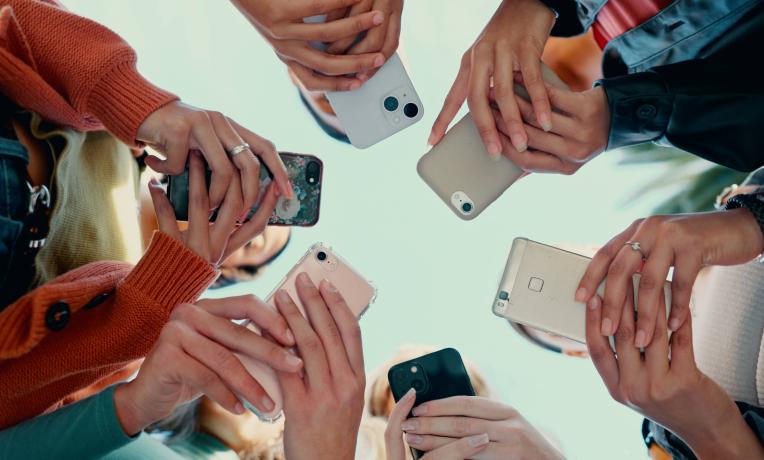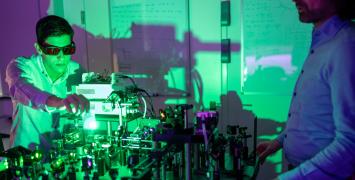What smartphones mean worldwide

By Rosaria Carbone
Most research and public discussion tend to focus on the downsides of smartphones - addiction, misinformation, harmful impact on children and so on. Anthropologist Daniel Miller has taken a different approach, leading a comprehensive ethnographic study to understand smartphone's role in the everyday life of ordinary people around the world.
Together with a team of 11 anthropologists conducting fieldwork in 10 countries - from Uganda to Japan, Brazil to Italy - he investigated how different populations experience and interpret smartphone use. The findings highlight that while smartphones are a global phenomenon, cultures shape both their adoption and the meanings attached to them.
‘In China, older people often see technology positively and associate it with national progress. They believe using it helps the country become the vanguard of innovation’ Miller explains. ‘Whereas in other countries, they often think technology is just for the young and view it as too difficult or worry that it dehumanises us. The way people react to technology depends not just on age, but also on cultural attitudes and beliefs.’
A home, not just a phone
One of the most striking insights from Miller’s research is a redefinition of what the smartphone actually is. He and his team propose viewing it not just as a communication device, but as a ‘virtual home’ from which individuals carry out many daily activities, including working, socialising with others, finding information and entertainment, and more.
‘We all use the smartphone all day. We radically need to change our idea of what the device itself is. It is not a phone. Phone calls are a tiny proportion of what we use this object for’, says Miller. ‘By changing the way we talk about it, we can better understand how it shapes our daily lives.’
Challenging age stereotypes
Miller also challenges the widespread belief in a ‘natural’ affinity between technology, digital media and youth. ‘Fifteen years ago, nobody would have believed that people over 40 would ever use social media or smartphones. We were the first to demonstrate that this assumption is wrong. In the UK today, people over 50 use smartphones more than any other age group, except those under 20’, he notes.
His work is particularly focused on individuals aged 45 to 70, a group often overlooked in previous studies. The findings reveal a much more accurate picture of the actual smartphone usage in the world today.
Importantly, for older people, smartphones contribute to a sense of continuity in life, making them feel less old. ‘Our findings challenge the way we think about ageing. As people live longer, it’s becoming harder to draw a clear boundary between ‘young’ and ‘old’, because those categories no longer reflect how people see themselves or live their lives’, Miller suggests.
However, this varies significantly across countries. In Uganda, where life expectancy is lower, the elderly population is smaller. In contrast, in Japan it is becoming the dominant population, illustrating how context shapes the adoption and use of new technology.
Access to health information
One of the most important aspects of the project was examining the smartphone's role in health and well-being. Often perceived as tools for distraction, smartphones have great potential for health education and management, according to Miller.
But in low-income countries, where reaching medical facilities is difficult, can people use smartphones to access vital health information that they otherwise could not?
‘We all look for health information on internet. At first glance, this seems wonderful because everybody now has equal access to incredible health knowledge. But I actually found the opposite’, says Miller. ‘Googling for health advice often exacerbates class inequalities. Well-educated people know how to navigate that information effectively. Others may be more vulnerable to misinformation or fearmongering, becoming confused or anxious.’
His observations in poorer countries such as Uganda reveal significant and unexpected health benefits derived from smartphone use, but not necessarily in the ways one might expect.
‘Young people who migrate to urban areas use their phones to support elderly relatives in rural villages. The key to helping them is not health information, but it is money. In Uganda, mobile phones are the primary tool for transferring money, and medical care is often a financial emergency. Young people use their phones to transfer cash, enabling their parents to afford treatment and medication’. He continues: ‘This was an unexpected finding. These studies showed that the actual way the phone relates to health issues isn't necessarily always what we assume.’
A diversified local approach
The smartphone emerges from this research not as a gadget or a threat but as a device that both mirrors and transforms the societies in which it is used. Miller emphasises that these insights were only possible through long-term, in-depth fieldwork.
The ERC grant enabled him to work with an international team that had the relevant expertise, spoke the local languages and deeply immersed themselves in the communities they studied. ‘Fieldwork lasting 16 months in each location allowed us to adapt and respond to local realities. What works in one place may be completely inappropriate in another’, Miller concludes.’ Working with women or minority groups, for example, requires different approaches depending on the cultural context. Understanding the cultural dynamics was key to the project's success.’
Biography
Daniel Miller is professor of anthropology at University College London. He is author/editor of 47 books on the study of material culture and digital anthropology. He was awarded two consecutive ERC Advanced Grants. Miller’s ERC projects have been notable for their comprehensive dissemination strategies, including short films, comics and books translated in the languages of the field sites. This approach led to over 2.25 million downloads of these books .





